After a brief stall, Florida students and teachers are again making nationally notable gains on a closely watched test.
Released Thursday, the latest results from the National Assessment of Educational Progress, better known as “the nation’s report card,” show Florida students making solid growth between 2011 and 2013 on three of four tests that are used to compare achievement from state to state.
The NAEP reading and math tests are given every other year to representative samples of fourth- and eighth-graders in all 50 states.
Fueled by the performance of low-income and minority students, Florida was one of only four states that made statistically significant score gains on both the eighth-grade reading and eighth-grade math tests. It was also one of only seven states that showed a statistically significant increase in the percentage of students scoring at or above the basic level on fourth-grade reading, with a jump from 71 to 75 percent. (See charts below for the Florida and U.S. trend lines.)
The improved scores are “an example of what can be accomplished when we focus on what is important,” Florida Education Commissioner Pam Stewart said in a written statement.
The latest results will have academic repercussions in the Sunshine State, a national leader in ed reform for more than a decade, and, maybe, political and legal ones. For embattled ed reformers, they bring a sigh of relief. For critics, they bring more evidence, despite oft-repeated arguments, that Florida public schools continue to improve faster than schools just about anywhere.
Here’s the context:
Between the late 1990s and 2009, Florida was arguably the national pacesetter on NAEP progress, moving from the bottom tier of states on all four core tests to the middle tier or better on three of them. It is impossible to sort out which factors led to rising trend lines, but Florida’s escape from the national cellar coincided with the sweeping policy changes ushered in by former Gov. Jeb Bush. Generally, the changes stressed higher standards, expanded school choice and top-down regulatory accountability. More specifically, they included school grades, private school vouchers, third-grade retention and an intense focus on literacy in early grades. Over the second half of that span, Florida also modestly shrunk class sizes and rolled out a popular, voluntary pre-kindergarten program, both prompted by voter-approved amendments to the state constitution.
Then came 2011.
Trend lines dipped. Critics pounced. And a decade’s worth of gains, already overlooked by most of the Florida press, were subsequently buried under headlines about school grading snafus, a revolving door in the education commissioner’s office and, most recently, attacks on Common Core.
Like the previous gains, the latest ones were amped by the performance of students who typically struggle the most. In fourth-grade reading, test scores for Florida Hispanic students rose five points while the national average went up two. In eighth-grade reading, Florida’s black students gained six points while their national counterparts moved up two. In eighth-grade math, Florida’s disabled students saw a five-point increase, while disabled students nationally dropped a point.
Florida showed the least progress in fourth-grade math. Scores rose by two points, but it was not enough to be considered statistically significant. The percentage of students scoring at basic or above also remained unchanged, at 84 percent, though the percentage at proficient or above rose from 37 to 41 percent.
In Florida, especially, test scores mean a lot.
The new numbers will give reformers new leverage. They could play a role in next year’s governor’s race. They could even wind up in court. They might matter politically if Republican Gov. Rick Scott continues to more-or-less stick with the Bush vision of ed reform, and if probable Democratic nominee Charlie Crist, who once did likewise, attempts to draw bigger contrasts. They matter legally given a high-profile lawsuit, led by the Orlando-based parents group Fund Education Now, that charges the state with failing to provide high-quality schools.
More immediately, the results will spark questions about why. Coincidentally or not, Florida’s NAEP scores hit that 2011 snag during some of the deepest funding cuts in decades. And coincidentally or not, the latest numbers synch with upgraded academic standards and tougher state tests, introduced a few years ago, that state education officials see as a bridge between older standards and Common Core.
Nationally, NAEP scores rose modestly: 1 point in fourth-grade math, fourth-grade reading and eighth-grade math; two points in eighth-grade reading.
In a written statement, U.S. Secretary of Education Arne Duncan called the results “encouraging but modest.” Despite them, he added, “U.S. students are still well behind their peers in top-performing nations.”
On the fourth-grade tests, seven states showed statistically significant gains in reading, 14 in math.
On the eighth-grade tests, 12 showed gains in reading and five in math.
Only Tennessee showed gains on all four tests.
Press releases: Florida Department of Education. Foundation for Florida’s Future.
Other coverage: Tampa Bay Times, Education Week, Washington Post, New York Times, Politics K-12 blog, StateImpact Florida, Jay P. Greene’s Blog, Hechinger Report, Fort Myers News Press, Pensacola News Journal, Orlando Sentinel, Richard Whitmire.
redefinED contributors Ron Matus and Patrick R. Gibbons contributed to this report. This post is a work in progress. Check back for updates.


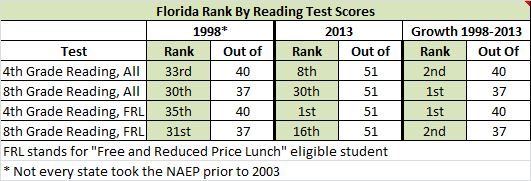
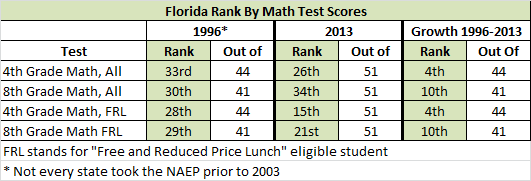
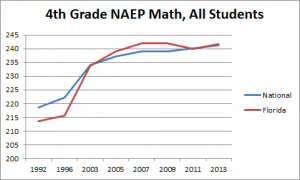
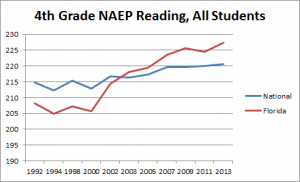
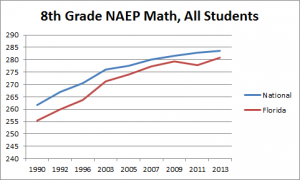
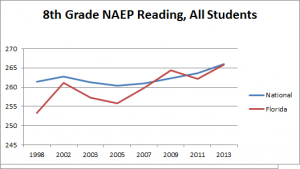

First no mention of the class size but say I go, you know I have had it all wrong, Bush’s reforms really do work, then why has the state done so many things to kneecap teachers? No more tenure, which was really work protections that teachers got after years of quality service, the three percent pension theft, teachers are some of the lowest paid around, merit pay etc etc etc.
if Florida is an has been on the cutting edge like you say then why has it treated its teachers so shabbily?
Hi Chris,
Class size reduction did occur and it may have contributed to Florida’s gains (that reform was mentioned in the article above). However, researchers have long known that class-size reduction is an expensive and ineffective way to improve student achievement (class sizes have been dramatically reduced since the 50s and each additional reduction produces fewer and fewer benefits to students at a higher and higher cost). It is also questionable as to whether class size reduction contributed to Florida’s gains over the last decade as cited by a Harvard study in 2010: https://educationnext.org/floridas-class-size-amendment-did-it-help-students-learn/
In July 2012 then ed commissioner Gerard Robinson told me the class size amendment and Florida’s other reforms were equally important.
https://jaxkidsmatter.blogspot.com/2012/07/florida-ed-commissioner-says-gary.html
You know who loves the class size amendment? teachers, parents and students and it is beyond the pale to say failing 3rd graders helped but smaller classes didn’t.
And the Harvard study shows that resources have alternative uses other than class size reduction and that these alternative uses can produce the same or better results.
It is not beyond the pale to say class size reduction had little to no impact when that is what the research shows. People liking X and X having a real measurable impact are two different things.
It is a good thing science is not a popularity contest.
I took my lunch 37 minutes and I looked at the Harvard piece and to be honest I feel like they write those things with the purpose of giving sound bites and putting regular folks to sleep, so I looked for reviews and found several that were critical of its methodology and findings. So yes science is not a popularity contest but maybe we should look beyond that which backs up our per-conceived belief. Just wondering and I know it is off topic whats your take on climate change, i find the right often has no problem ignoring that science.
At the end of the day study after study says smaller classes work and all the Harvard study really says when you get past the science speak and minutia is maybe other things might have worked better.
Hi Chris,
Study after study shows that class size reduction is far less effective than expending those resources in other ways: https://hanushek.stanford.edu/sites/default/files/publications/class%20size.ppi6_.revised.pdf
Class size reduction activists essentially make the argument that we either reduce class sizes or the money vanishes into thin air and we do nothing with it. Economists understand that resources always have alternative uses. When measuring the impact of alternative uses, researches find bigger impacts on student achievement when the money is used on something other than smaller class sizes. This is likely due to another economic concept: diminishing rates of return on the investment.
As far as climate change is concerned it is real and humans are having an impact. Scientific facts and the solutions for addressing the concerns raised by those facts are two very different things. That is something people on the right and left sometimes forget.
I guess the argument can be made that resources can be better spent in other ways but here in Florida, the class size didn’t replace resources allocated to education instead It added extra resources to education.
Are you suggesting the Florida legislature was just about to give an extra 20 billion to our schools for them to use as they please?
It is unlikely the legislature would have done anything extra without the amendment.
[…] After a brief stall, Florida students and teachers are again making nationally notable gains on a closely watched test. […]
[…] Florida Again Showing Progress on NAEPRedefineEd reports significant gains on NAEP 8th grade reading and math tests due to improving scores of low income and minority students from 2011-13.. […]